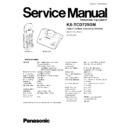Panasonic KX-TCD725GM Service Manual ▷ View online
8 CHECK PROCEDURE (BASE UNIT)
8.1.
EQUIPMENT REQUIRED
8.2.
INITIAL POWERTESTS
1. Turn on the 9V supply.
2. Check for approx. 100mA current on the 9V supply line.
3. Check the 3.8V supply rail at TP91. It must be 3.8V ± 0.2V.
4. Check the 2.8V supply rail at J100. It must be 2.8V ± 0.2V.
29
KX-TCD725GM
8.3.
SET THE CLOCK FREQUENCY
1. Turn on the 9V supply.
2. Enter "DEACTMAC" from the PC to switch off the RF unit.
3. Enter "CONTTX 0" to start continuous RF transmission.
4. Enter "RDEEPROM 00 00 0F" to display the first 15 hexadecimal bytes of the EEPROM.
The frequency adjustment value is displayed in the first two locations with the most significant byte (MSB) first.
5. Connect the frequency counter probe to TP101, or pin12 of the RF module, to measure the SYRI signal from the BBIC.
6. The clock frequency should be within 10,368,000Hz ± 10Hz. If not then enter "SETFREQ nn nn" where nn nn are the clock
frequency adjustment values. An increase in the value will lower the clock frequency and vice versa. The maximum value is 03
FF.
FF.
7. Switch off the 9V supply.
8.4.
LOOPBACK TESTS
1. Connect the RF Cable from the CMD60 to the RF2 line (IC4 pin44) and Ground plane of the base P.C.B. Use the minimum
amount of stripped/exposed cable to solder to the contacts.
2. Switch on the 9V supply.
3. Set the CMD60 to MANUAL TEST mode.
4. Set the CMD60 TRAFFIC CARRIER to 0.
5. Invoke the "TESTMODE" batch file from the PC.
6. Press ACCEPT RFPI and SETUP CONNECT on the CMD60.
7. If connection is successful the CMD60 will display “CONNECTION ESTABLISHED”.
8. Enter “ANT2” to direct the RF output to the “RF2” terminal.
9. Check the power (NTP): it must be between 20 and 25dBm.
10. Press MODULATION.
11. Set DATA TYPE to FIG 31.
12. Check frequency drift: must be 0 ± 35 kHz/ms.
13. Check frequency offset: must be 0 ± 40 kHz.
14. Check deviation or modulation (max ± B field) with data type "FIG 31": must be 320kHz to 400kHz.
15. Press Menu Up "
↑" on the CMD60.
16. Press POWER RAMP.
17. Check that the burst fits the mask.
18. Press Menu Up "
↑" on the CMD60.
19. Press BER.
20. Obtain the sensitivity by slowly reducing RF LEVEL until the BER falls below 1000ppm. The sensitivity is the RF LEVEL reading
at this point. It must be < -88dBm.
21. Press Menu Up "
↑" on the CMD60.
22. Press BEARER RELEASE and switch off the 9V supply.
23. Disconnect the RF cable from the PCB.
Note:
These tests can also be repeated on TRAFFIC CARRIERS 5 and 9.
30
KX-TCD725GM
8.6.
CHARGE CURRENT TESTS
8.5.
TELEPHONE LINE TESTS
1. Switch on the 9V power supply.
2. Connect a telephone cord from the base unit to the line/DTMF test set.
3. Enter "HOOKOFF" from the PC to invoke an off-hook condition.
4. Set the current limit to 40mA on the line simulator.
5. Enter "HOOKON" from the PC to invoke the on-hook condition.
6. Check that the line current has dropped to 0 ± 0.5mA.
7. Enter "HOOKOFF".
8. Use a DMM to test the off-hook voltage at TP50. It must be 6.5V ± 1.0V.
9. Enter "LINEIMP 1" at the PC to switch on the pulse-dialing impedance.
10. Check the DC voltage at TP50. It must be < 3.5V.
11. Enter "LINEIMP 0" at the PC to switch off the pulse-dialing impedance.
12. Enter "DTMF_UP" to make the base generate the upper DTMF frequency.
13. Check that the upper frequency is detected by the line/DTMF test set. Must be 1477Hz ± 1.5%.
14. Enter "DTMF_LO" to make the base generate the lower DTMF frequency.
15. Check that the lower frequency is detected by the line/DTMF test set. Must be 852Hz ± 1.5%.
16. Switch off the 9V power supply.
17. Disconnect the telephone line and reconnect the base to the Bell oscillator.
18. Switch on the 9V supply.
19. Enter "RINGDET" to check the ring detection status. The command returns a number to the PC display. "0" = no ring.
20. Switch the bell oscillator on to 23Hz, 30V RMS.
21. Send the batch file "RINGDET".
22. Check that the Number on the PC display has changed to "1".
23. Switch off the 9V power supply.
1. Switch on the 9V power supply.
2. Connect an ammeter directly across the charge terminals (effectively short circuiting them).
3. Measure 270mA ± 15% through the meter.
4. Switch off the 9V power supply.
8.7.
TAM VOICE PROMPT DOWN LOAD
1. Connect the parallel cable from the VOICE PROMPT DOWN LOADER to TP1, TP3, TP4, TP6 and TP7 of base P.C.B.
2. Connect the serial cable from the PROM DOWN LOADER to J102, J103 and J104 of base P.C.B.
3. Switch on the 9V supply.
4. Invoke “vploadenable” batch file from the PC.
5. Invoke “go” batch file from the PC.
6. Display of “Save EW Function OK” from PC and conplete.
31
KX-TCD725GM
9 CHECK PROCEDURE (HANDSET)
9.1.
EQUIPMENT REQUIRED
9.2.
INITIAL POWERTESTS
1. Switch on the 2.4V supply.
2. Switch the handset on at the keypad.
3. Check for approx. 120mA current on the supply line for around 10s.
4. Check the 3.8V supply rail at TP11. It must be 3.8V ± 0.2V.
5. Check the 2.65V supply rail at the collector of transistor T6. It must be 2.65V ± 0.2V.
6. Switch off the 2.4V supply.
32
KX-TCD725GM
Click on the first or last page to see other KX-TCD725GM service manuals if exist.

